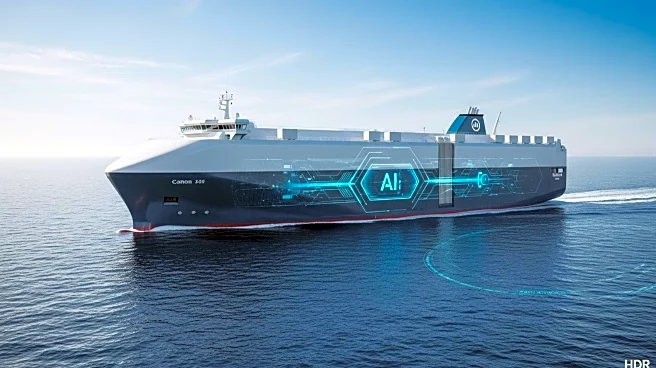What is the story about?
What's Happening?
NYK, MTI, and Grid Co. have collaboratively developed an AI-based system designed to automate and optimize the allocation plan for car carriers. This system, which began full-scale operations at NYK in July, aims to streamline the traditionally complex and labor-intensive process of ship allocation planning. The system evaluates millions of potential shipping schedules several months in advance, taking into account various factors such as customer requirements, fleet operating status, repair schedules, and port congestion risks. By doing so, it optimizes key performance indicators like vessel utilization, transport efficiency, and transport costs. Additionally, the system incorporates considerations for next-generation fuel ships and carbon pricing, contributing to reduced greenhouse gas emissions.
Why It's Important?
The introduction of this AI-based system marks a significant advancement in maritime logistics, potentially transforming the efficiency and environmental impact of car carrier operations. By automating complex planning processes, NYK can achieve higher accuracy and efficiency, which is crucial for maintaining competitiveness in the global shipping industry. The system's ability to optimize transport costs and improve vessel utilization can lead to substantial cost savings and increased operational efficiency. Furthermore, its focus on reducing greenhouse gas emissions aligns with global efforts to decarbonize the maritime industry, supporting sustainability goals and regulatory compliance.
What's Next?
As the system continues to operate, NYK may explore further enhancements and integrations to expand its capabilities. Stakeholders in the maritime industry, including other shipping companies, may observe the system's performance and consider adopting similar technologies to improve their own operations. Additionally, regulatory bodies might take interest in the system's environmental benefits, potentially influencing future policies on emissions and sustainability in shipping.
Beyond the Headlines
The deployment of AI in maritime logistics not only improves operational efficiency but also raises questions about the future of labor in the industry. As automation becomes more prevalent, there may be shifts in workforce requirements, necessitating new skills and training for maritime professionals. Moreover, the system's focus on carbon pricing and next-generation fuels highlights the growing importance of environmental considerations in business strategies, potentially influencing broader industry trends towards sustainable practices.
















